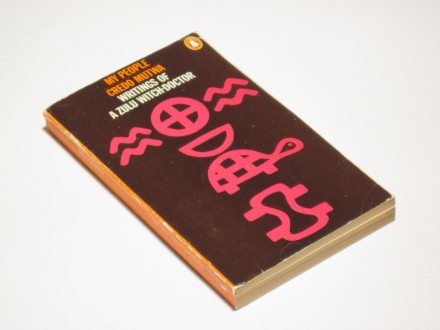Credo Vusa`Mazulu Mutwa - My People: Writings of a Zulu
| Cena: |
| Želi ovaj predmet: | 3 |
| Stanje: | Polovan bez oštećenja |
| Garancija: | Ne |
| Isporuka: | Pošta CC paket (Pošta) Post Express Lično preuzimanje |
| Plaćanje: | Tekući račun (pre slanja) Lično |
| Grad: |
Beograd-Zvezdara, Beograd-Zvezdara |
ISBN: 014003210X
Godina izdanja: 1977
Jezik: Engleski
Autor: Strani
Credo Vusa`Mazulu Mutwa - My People: Writings of a Zulu Witch-Doctor
Penguin, 1977
332 str.
meki povez
stanje: dobro
“The law requires that if a woman gives birth to twins, one must be destroyed by having a round pebble pushed down its throat. But in the case of triplets, one must die and two must live”
“My People”, Chapter 10, Pg. 218
Credo Mutwa began his life in Zululand on July 21 – 1921. He has heard about his origins and ancestral history from his father, because of the influence on his life for the most part of it. Followed by the great influenza outbreak, Credo’s father had to reallocate to save whatever was left of his family. His wife and several children had already died in South Africa.
It was 1920, just one year before Credo’s birth, when his father met a young Zulu girl. She wasn’t Christian and still practiced the religion of the old zulu tribes, and that’s where the problems started. Credo’s father had to convince his wife to embrace Christianity as her new religion - Otherwise the white missionaries would never approve of the marriage.
However, on Credo’s mother side, the family wasn’t inclined on letting their daughter go and get married to a Christian man. Her father had just been involved in the wars with the English and was of the view that Christians were barbaric thieves who stole Africa at gunpoint. Mutwa sometimes recalls his grandfather as he used to say, “I cannot allow my child to become a Christian. These Christians are a race of thieves, of liars, and murderers, who stole our country from us at sword point and at gunpoint. I would rather die than see a Christ worshipping Christian within the stockade of my village. Never!`
Little did he know that the couple was so much intensely in love that the Zulu girl was already impregnated with a child, who was later named as Credo Mutwa. Since the couple’s sides never agreed to them getting married, they did not have a choice except to part ways. The father vanished for the time being and the Zulu girl was made to return to her native village, where she faced a cold response.
The Zulu’s found it a great shame and dishonor for any child to be born out of wedlock. Hence, Credo’s mother had to live in a nearby village at her aunts, where she gave birth to him later on. After a couple of years, the father allowed his daughter to return, for he loved her dearly. But Credo was always despised, which is why he was sent to one of his father’s younger brothers who came all the way from the Natal South Coast to meet the child.
“Remove this disgrace from my home, Christian fellow!” the grandfather said to Mutwa’s uncle, “And tell your brother that if I ever set eyes on him, I will make him suffer bitterly for what he did to my daughter. I will seize him and kill him very slowly indeed. Tell him that.”
At the age of 14, Mutwa was sent to school. He couldn’t attend classes earlier because of his father’s nature of job; it took them from one town to another. From 1935 to 1937, Credo and his family had to move to different places, due to their father’s ongoing building profession. He settled down in the Transvaal for a long time, which is where Credo pursued his education properly.
1937 was also a year of shock and trauma because a gang of mine workers, who sodomized the young boy outside of a mine compound. Young Mutwa was left scared and didn’t come out of the covers for a few weeks. Thinking that he might be “sick”, the family took him to various white doctors for examination but to no avail.
It was then that it was decided for Mutwa to be taken back to the Zulu village whence he came from. The same grandfather lovingly took the boy in and cared for him as if he was one of their own. Where the white doctors failed, Mutwa’s grandfather distinctively succeeded. From then onwards, different questions started plaguing Credo Mutwa’s mind:
Were our ancestors really the savages that quiet missionaries would have us believe they were?
Were we Africans really a race of primitives who possessed no knowledge at all before the white man came to Africa?
Other queries had also made their way to this young individual’s mind and soul, which convinced him to become a shaman healer. At the hands of a young Songoma, known as Myrna, Cre
Nonfiction, Anthropology
Plaćanje pouzećem i postnetom za sada nisu opcija.
Lično preuzimanje je isključivo na Konjarniku uz prethodni dogovor.
Hvala na razumevanju.
Predmet: 60236337







